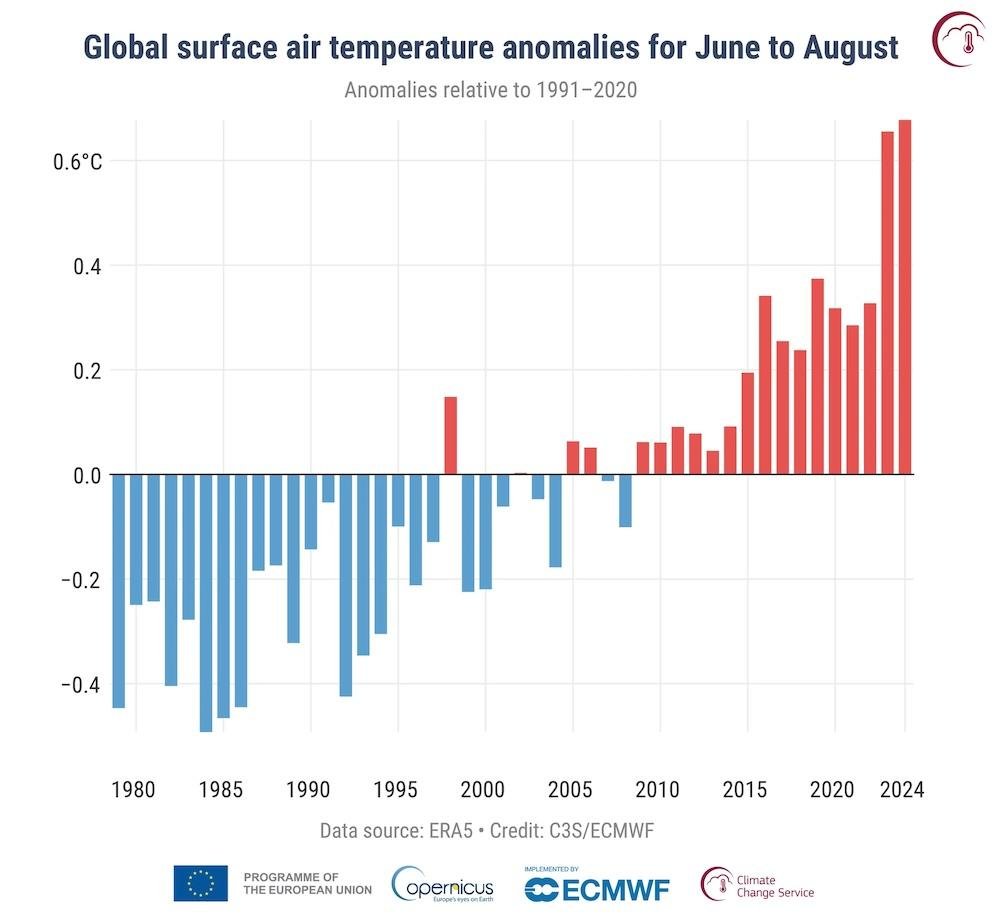Business
Scorching 2024: Earth Shatters Records with Hottest Summer in History

This summer marked the hottest on record globally, setting the stage for 2024 to potentially exceed last year’s temperatures, according to the European Union’s climate monitor. The Copernicus Climate Change Service reported that this sweltering season is part of the warmest 12-month stretch ever recorded, primarily influenced by the recent El Niño phenomenon and ongoing human-induced climate change.
August’s global average temperatures mirrored last year’s record heat, coming in at 0.7 degrees Celsius (1.2 degrees Fahrenheit) above the norm. This continuity in extreme temperatures saw 13 of the last 14 months reach alarming highs. Notably, July fell short of a monthly record by a narrow margin, although July 22 was recorded as the hottest day ever documented.
In the Northern Hemisphere, the average temperature for the summer months of June, July, and August reached 16.8 degrees Celsius (62.24 degrees Fahrenheit), surpassing the previous record set in 2023 by a slight margin. Samantha Burgess, Deputy Director at Copernicus, stated, “This string of record temperatures is increasing the likelihood of 2024 being the hottest year on record.” The projections suggest that without a significant drop in average temperatures, 2024 will likely eclipse last year’s unprecedented warmth.
With climate shifts manifesting as severe weather events, this summer has seen harsh heat waves, droughts, and intense storms across the Northern Hemisphere. El Niños, known for their influence on global weather patterns, have played a role, but they are expected to wane, giving way to La Niña conditions, which may bring cooler temperatures and increased rainfall by year-end.
Europe experienced a mix of extremes, with southern and eastern regions suffering from intense heat, while parts of the UK, Ireland, and portions of Portugal enjoyed milder, wetter conditions. Meanwhile, the Mediterranean basin faced prolonged droughts, resulting in critical water shortages and rationing in Spain and Italy.
In the United States, particularly in the Southwest, the mercury soared. Cities like Phoenix recorded over 110 degrees 55 times this summer, tying a record from the previous year. Other regions, including northeast Africa, Iran, China, Japan, and Australia, also experienced above-average temperatures.
Japan’s summer proved particularly severe, with an average temperature of 1.76 degrees Celsius (3.16 degrees Fahrenheit) above normal for June, July, and August—marking it the hottest summer since records began in 1898. In terms of ice, the Arctic saw its fourth-smallest extent of sea ice for August, 17% smaller than the average, while Antarctic ice levels were 7% below average—the second lowest amount recorded.


















